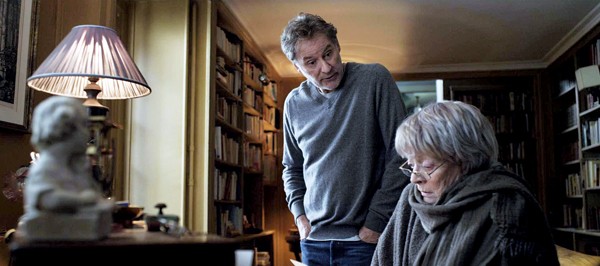Israel Horovitz’s My Old Lady stars Kevin Kline as Mathias Gold, a down-and-out divorcee from New York who travels to Paris because he may have struck it rich. The film’s opening scenes show him casing an impressive, dimly lit two-story Parisian apartment he’s inherited from his late father: It may only have one toilet, but it’s in a great neighborhood and it’s roomy enough to get lost in. Selling it for a few million euros should be a breeze.
There’s a problem with Mathias’ apartment-flipping scheme, though, and its name is Madame Mathilde Girard (Maggie Smith). Mathilde has been living in the apartment for 70 years; she warms herself with blankets, fine wine, and memories of her fling with Django Reinhardt. Thanks to a French property agreement called a viager, she doesn’t own the place, but she receives a monthly stipend from the apartment’s owner as long as she lives. So, instead of inheriting a potential fortune, Mathias inherits chronic debt.
To make matters worse, Mathias is essentially penniless when he arrives, while Mathilde is not only financially well-off but in perfect health. Although she shares the apartment with her middle-aged daughter Chloé (Kristin Scott Thomas), she’s kind and lonely enough to let Mathias stay a while and figure out his next move.

Kevin Kline and Maggie Smith
Eventually, numerous family secrets, recriminations, and revelations surface, which turn the light comedy of the opening scenes into something darker and more melodramatic. The plotting is stale, but in a meandering, autumnal stage-to-screen adaptation like My Old Lady, the pleasures don’t come from the plot; they come from watching talented actors freshen up their lines and flesh out their characterizations through a combination of subtle vocal shifts and eccentric physical gestures.
Kline, Smith and Thomas are crafty enough to make Eugene O’Neill family picnics like My Old Lady moderately enjoyable for a while. Mild-mannered Mathias is too bland at first, but he gradually reveals himself to be a person for whom casual cruelty is as frequent and involuntary as blinking. Plus, when Mathias falls off the wagon, Kline finds the perfect excuse to play with the tempo and rhythm of the dialogue; Mathias’ speeches frequently swerve from sentimentality to sarcasm to self-justification to sadness before dissolving in the ash-grey light.
In contrast, Smith earns points just by showing up and being herself. Most of the time she shuffles around her abode or sits cocooned in blankets. Her words waver and wobble throughout, but during some silent stretches when she’s reading or staring at some long-lost photos, the weight of her life gains volume and presence.
But Thomas is the ringer here. She plays off Smith with skill, economy, and fury late in the film, and her reaction to one of Kline’s most shocking stories trumps the story itself. Her passion and quiet rage belong in a better film.